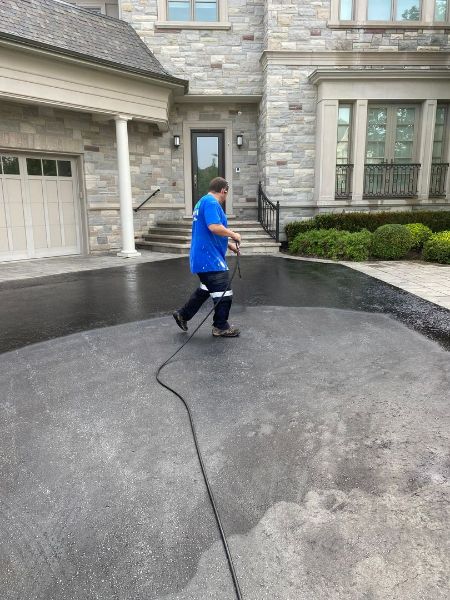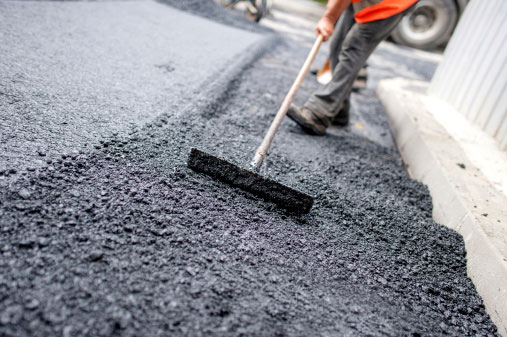Seal in Top Quality: Expert Solutions for Asphalt Repair and Sealing
Seal in Top Quality: Expert Solutions for Asphalt Repair and Sealing
Blog Article
Cold Mix Asphalt Vs. Hot Mix Asphalt: Which Is Right for You?

Make-up Distinctions
Cold mix and warm mix asphalts differ dramatically in their make-up, with unique attributes that impact their performance and applications. Cold mix asphalt is produced by emulsifying the asphalt binder with water and an emulsifying representative before blending it with accumulation. This approach enables the asphalt to be practical at reduced temperatures, making it suitable for momentary fixings and for usage in cooler weather condition conditions. Warm mix asphalt, on the other hand, is produced at heats, usually between 300-350 ° F, which assists to achieve better compaction and an extra resilient end product. The hot mix asphalt manufacturing procedure entails heating up the aggregate and asphalt binder independently prior to incorporating them at the asphalt plant.
Furthermore, cold mix asphalt has a tendency to be much less thick and more adaptable than warm mix asphalt. This adaptability makes it far better fit for areas with higher degrees of motion, such as driveways or roadways with rush hour. In comparison, warm mix asphalt is understood for its high toughness and resistance to rutting and breaking, making it a favored selection for highways and high-traffic roads where long life is critical.
Setup Process Variances
The procedure of setting up cool mix and hot mix asphalt shows noteworthy variances in their treatments and requirements. In contrast, hot mix asphalt necessitates a more elaborate setup procedure. Due to the home heating demands, warm mix asphalt installments are normally brought out by professionals with customized devices, making sure a much more structurally sound and irreversible result.
Resilience and Long Life Elements
When thinking about asphalt alternatives, durability and durability are vital elements to assess for lasting pavement performance. Warm mix asphalt (HMA) is understood for its phenomenal longevity and longevity. The heats throughout the laying and mixing procedure enable much better compaction, resulting in a denser and more powerful sidewalk framework. This results in HMA being more immune to rush hour loads, severe weather, and the results of aging contrasted to cool mix asphalt (CMA)
In terms of durability, HMA usually surpasses CMA due to its superior toughness and resistance residential properties. HMA sidewalks have a longer life span, requiring much less frequent repair services and maintenance, which can convert to set you back financial savings in the future. Furthermore, HMA pavements are much more easily customizable to meet particular project needs, better enhancing their toughness.
Price Factors To Consider
Considering the financial effects is an essential facet when evaluating the choice in between warm mix asphalt (HMA) and cold mix asphalt (CMA) for sidewalk jobs. While the initial cost of warm mix asphalt is normally higher than that of cold mix asphalt, HMA often provides a more economical service in the long run as a result of its superior durability and longevity. HMA is understood for its capability to endure hefty web traffic lots and rough climate condition, decreasing the demand for regular fixings and maintenance. On the other hand, cool mix asphalt is a lot more affordable ahead of time but may require even more constant patching and resurfacing, causing higher upkeep prices over time.
In addition to material costs, it's important to consider the expenditures connected with setup and maintenance when contrasting HMA and CMA. HMA generally needs customized devices and competent labor for appropriate installation, which can influence total task expenses. Alternatively, CMA is less complicated to deal with and can often be used using easier strategies, possibly lowering installment expenditures. Ultimately, the decision in between HMA and CMA ought to consider not simply the first cost but likewise the long-term financial effects to establish one of the most economical option for the particular pavement job.
Environmental Influence Comparison
Comparison of the ecological effects between hot mix asphalt (HMA) and cold mix asphalt (CMA) discloses unique distinctions in sustainability methods. HMA manufacturing calls for heats, causing boosted energy intake and greenhouse gas emissions. The procedure likewise launches unpredictable organic substances (VOCs) and dangerous air contaminants (HAPs) into the environment. In comparison, CMA is generated and applied at reduced temperatures, decreasing energy usage and exhausts considerably. The lower production temperatures of CMA result in lowered gas usage and lower degrees of carbon dioxide exhausts, making it an extra eco-friendly option.
In addition, the official statement use of CMA look what i found usually entails reusing existing asphalt pavement, promoting source conservation and decreasing the amount of waste sent to land fills. This recycling aspect additionally improves the sustainability of CMA compared to HMA. Overall, when taking into consideration the ecological impact, CMA becomes a more environmentally sustainable choice as a result of its reduced power demands, decreased exhausts, and the potential for reusing existing products. By deciding for CMA over HMA, roadway building jobs can contribute positively to environmental preservation efforts.
Verdict
In verdict, the selection between cold mix asphalt (CMA) and warm mix asphalt (HMA) depends upon numerous factors such as make-up, installation process, resilience, long life, cost, and ecological effect. asphalt patch repair. While CMA offers a economical and fast solution for minor repair work, HMA makes certain premium durability and longevity for heavy website traffic locations. Consider these variables meticulously to establish which sort of asphalt is the best selection for your paving requires

Considering the financial ramifications is a vital aspect when examining the selection between hot mix asphalt (HMA) and cool mix asphalt (CMA) for sidewalk tasks. While the first price of hot mix asphalt is normally higher than that of i thought about this cool mix asphalt, HMA often provides a much more economical solution in the lengthy run due to its exceptional longevity and long life. asphalt patch repair.Comparison of the ecological effects between hot mix asphalt (HMA) and cold mix asphalt (CMA) exposes distinctive differences in sustainability practices.In verdict, the selection between chilly mix asphalt (CMA) and warm mix asphalt (HMA) depends on different elements such as make-up, installation procedure, toughness, durability, expense, and ecological effect
Report this page